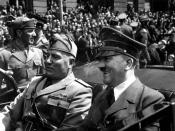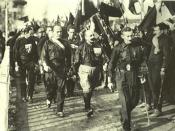Italy, the recently unified country of the 1920s, was in a very trying period of politics after the culmination of the First World War. Only one sole leader managed to emerge from this period establishing himself as "Il Duce" and making Italy very much a personal empire. This man was Benito Mussolini. Though, before the assuming of the glorious portrayed figure that he created he was very much a normal personality and in this essay I shall analyse the reasons for the transformation and the continued strengthening of power of Mussolini.
In order to understand Mussolini's rise to power it is important to look at the situation of Italy. As mentioned earlier Italy was in a state of much disarray where as much as four different politicians had tried to establish order in the Italian parliament in as much years. Amidst all this, Mussolini, along with his Fascist party, promised solidarity and strength and this was a chief reason for his rise to power.
Moreover, this strengthening of the nation was meant to be aggressive if undertaken by the Fascists commanded by Mussolini. Italy had been humiliated in the First World War by not being recognised or given any conquered territories after the war. Many Italians felt dismayed by this and the aggressive nature of the Fascists seemed to be an outlet for the people's anger.
Mussolini also built on nationalism more than any other figure of the time. The radical ideas that Mussolini brought emphasised the glory of the nation and in doing so appealed to many including King Victor Emmanuel who was won over by this nationalism. He chose Mussolini over D'Annunzio (the leading liberal politician) to be the Italian prime minister.
Furthermore, at the time communism had emerged victorious in Russia. The fear of...


